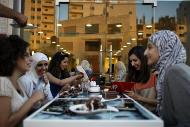
Besan is 23-years old and lives in Beir Nabala, a small village northwest of Jerusalem. A first impression reflects her commitment to Islam, dressed in the traditional hijab (head scarf) and jilbab. Staying true to her faith, every morning she performs ablutions prior to completing the first of her five daily prayers. Afterwards, she insists on drinking a much- needed cup of Nescafe (Palestinian alternative to American coffee) in order to continue with her day, confirming that coffee addictions are universal. Only then, Besan heads to a nearby village where she works full time as a secretary at a local school. In order to maintain good health and physique, she also complements her routine work schedule with trips to the gym. Concurrently, a combination of errands may follow, ultimately with her returning home to eat dinner, complete chores and spend the remaining of the evening with family.
According to traditional Palestinian customs, females are typically expected to be engaged or married when they reach the 18-24 age group (especially, if they have completed their higher education which Besan has) Correspondingly, her eldest sister married at the age of 20 and sequentially her younger sister followed at 18, triggering communal pressure from her parents and village to get married. However, Besan’s dreams and aspirations for the future challenge these expectations in Palestinian society and American misconceptions of Palestinian women. Before “tying the knot”, she’s determined to relocate to the United Arab Emirates and establish herself financially, contesting the Palestinian tradition of the husband’s family role as the primary breadwinner. Besan dreams of independence, financial and social, something which she is determined to achieve. Additionally, she hopes to travel the world with Turkey, Canada and Brazil on her itinerary.
In reality, Besan is practically a mirror image of young people everywhere, including Americans and even Palestinians themselves. They enjoy the company of friends and family; they go to restaurants and coffee shops and in Besan’s case, love to head to the major shopping district near her village, Ramallah’s booming city center.
Nejwa Ali is a Writer for the Media and Information Department at the Palestinian Initiative for the Promotion of Global Dialogue and Democracy (MIFTAH). She can be contacted at mid@miftah.org.
The world will pay for our genocide
Date posted: July 13, 2024
By Joharah Baker
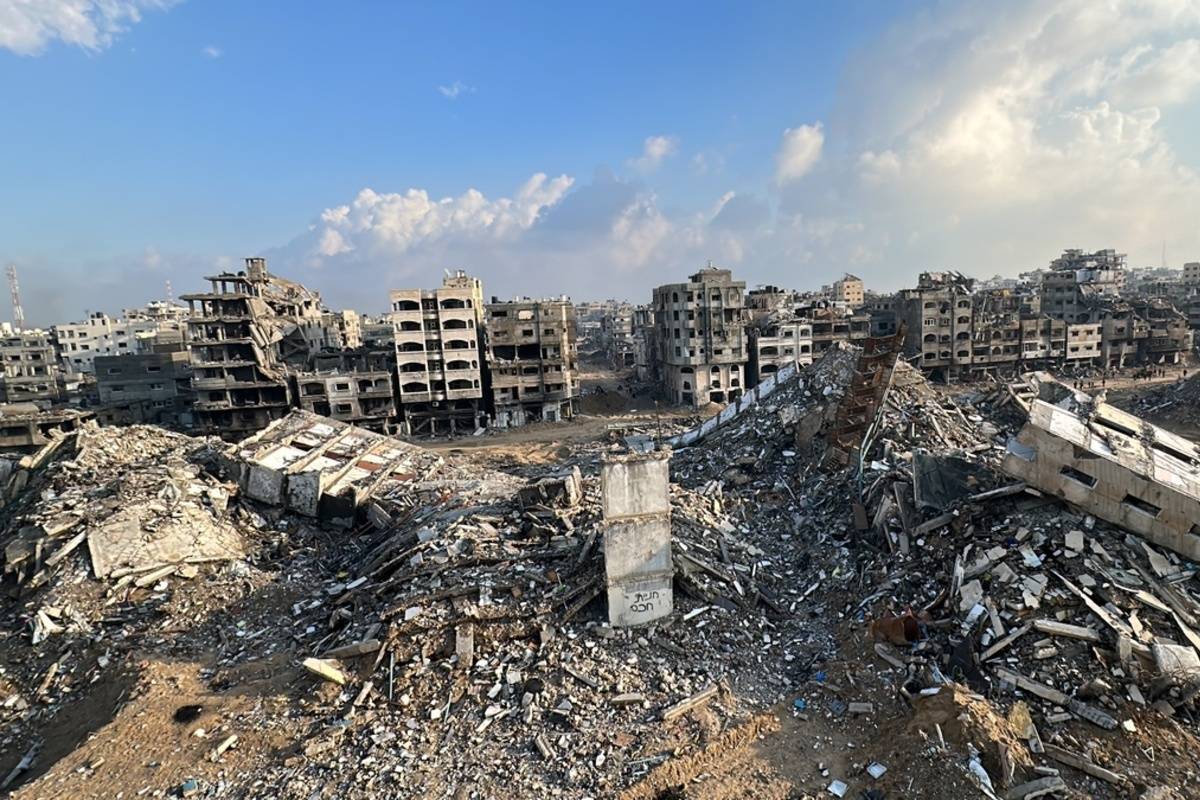
On a recent advocacy trip to Europe, I was asked by a young university student how to respond to his parents who shrug off the genocide in Gaza as something that is “unfortunately inevitable”. While this student maintained that his parents realized this was not an ideal situation, he admitted to struggling with their nonchalant attitude about the annihilation of the Palestinians. My answer was brief and to the point, albeit emotional. “Tell them: is this the kind of world you want to live in? Where a state can freely annihilate an entire people with impunity? Is this the world you want your children and grandchildren to inherit?”
The young man was well intentioned and he was clearly grappling with this existential conundrum. Jewish, he grew up in a household that believed in Israel and the Zionist project, but having witnessed what this entity and its ideology is capable of, he shifted course and is now trying to convince his parents it is their moral imperative to do the same.
Now over two months after this encounter, as Palestinians and many around the world continue to reel from the horrific scenes coming out of Gaza, this young man’s question has repeatedly crept back into my head.
In the past nine months, Israel has provided a sneak-peak into the world it envisions: one that does not question it, regardless of its atrocities; one where the word Palestine, along with its people, are wiped from map and memory. The Gaza slaughter is a foreshadowing of this new world order, which does not include us.
As the genocide grinds on mercilessly, the dead, wounded, missing and displaced soaring to unimaginable heights, a terrifying truth has dawned on us Palestinians: there is no question anymore whether the world will allow our extermination to happen or not. The answer is provided every day and with every unchecked massacre.
This world that really is callous, watching the slaughter of innocent men, women and children without blinking an eye. Or worse, they justify the rivers of Palestinian blood as “concerning” but immediately follow this up with the hackneyed phrase: “Israel has the right to defend itself,” or, “…but Hamas.” Where is the argument for the Palestinians’ right to self-defense against a brutal military occupation that has stripped them of rights and dignity for decades? Does that never calculate into the equation? Apparently not.
This is nothing new. Colonialist powers have always maligned the people under their colonization, dehumanizing them through language and deed as a means of justifying their annihilation. Indigenous peoples all over the world understand this painful reality, from New Zealand, to North and South America, to Africa and of course, Palestine. We are the “terrorists”, and the “human animals”, so our deaths will not matter.
This is where the world has it all wrong. To the parents of this young man who found his own humanity and compassion for the plight of Palestinians and was desperately seeking answers to how this compassion could be passed on to his parents, the answer is clear. The world will pay for this genocide in more ways than one, humanity being the first casualty. If “never again” signifies anything other than its literal meaning, then it means nothing at all, and this is a dangerous and slippery slope for everyone. If Israel is allowed to get away with mass murder and remain a nation among nations, who will stop Israel or others from doing this to another people ? Those who greenlighted this genocide from day one, unwittingly created a beast that will turn on them the first chance it gets.
The people united will never be divided
Date posted: April 30, 2024
By Joharah Baker
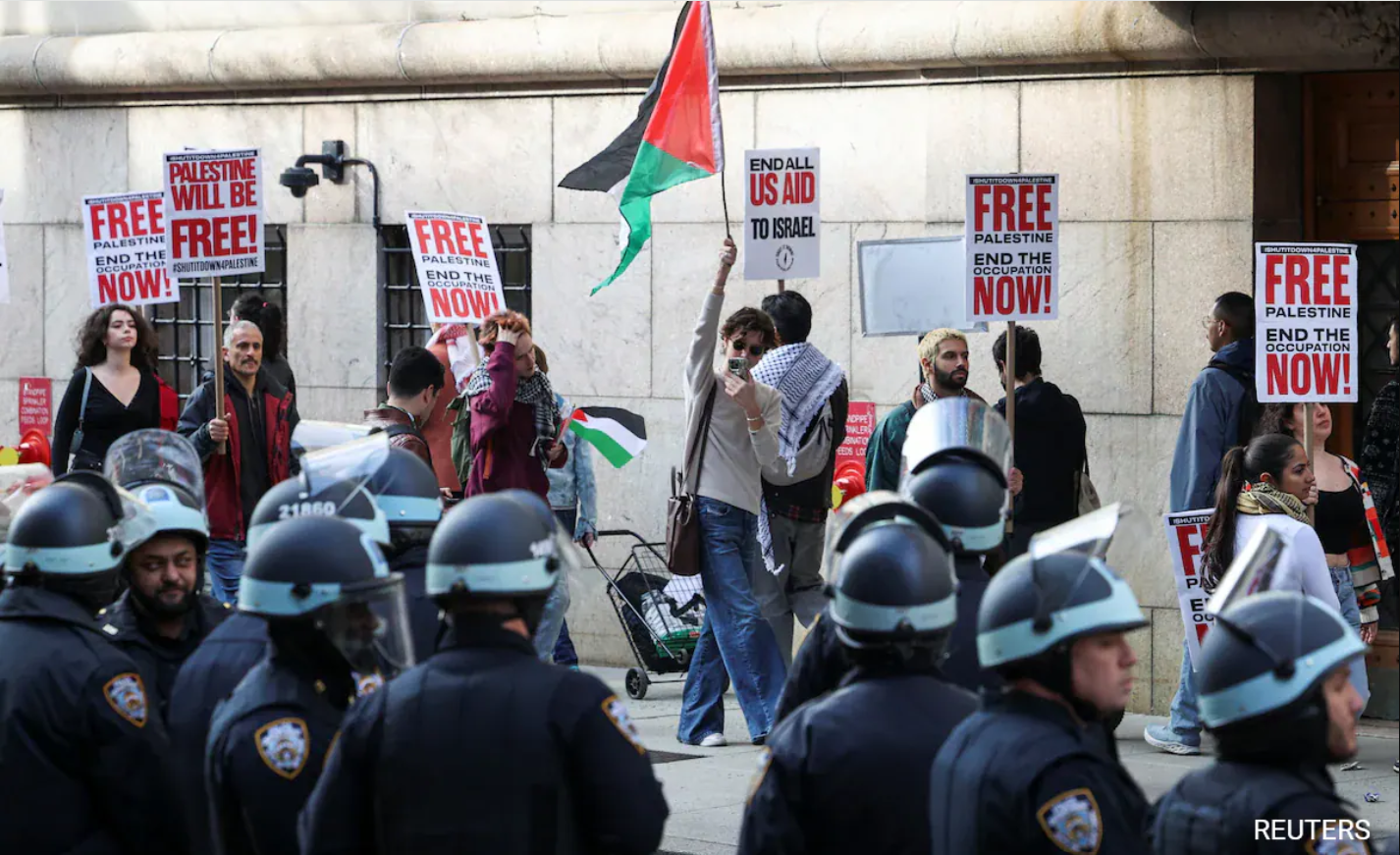
I was born in the United States and lived there through early childhood, but since returning with my family to Palestine, I have never wanted to go back. The United States has always evoked mixed feelings in me. I have a certain nostalgia for the place of my birth but my overall sentiments always culminated in a sense of resentment for this so-called superpower that has systematically aided in my people’s oppression, occupation and dehumanization.
That is, until present day. The scenes of American university campuses breaming with students in kuffiyehs, waving Palestinian flags and resisting the brutality of the police and their own university administrations, has uplifted my spirit in ways I cannot fully articulate. In a word, what is happening on US campuses today is validation of our people, of Palestine and of our struggle. To those who live comfortable lives in free countries, this may sound like an exaggeration, but for my people, who have been denied their very right to exist, who have been demoralized, demonized and dehumanized, this is huge. We are seeing students of all races, creeds, backgrounds and religions, calling for an end to the genocide in the Gaza Strip and marching for a free Palestine and divestment from the Israeli occupation. We are hearing Jewish voices, debunking Zionist propaganda and its below-the-belt attempts to conflate anti-Zionism with anti-Semitism. We are being validated for our struggle, for our resistance against oppression, occupation and settler-colonialism and we are finally being heard and seen.
Students have always been the litmus test for social and political justice. Rallies and demonstrations on university campuses have been the driving force against imperialist wars throughout the ages, the Vietnam War being the best example. However, what is so incredible about this movement is that American students are not directly involved in Palestine. Students are not being drafted into an army to fight on foreign soil, so the stakes are not as high for them at the personal level. What is happening today is the direct result of the intersectionality of struggles and the belief that no one is free until all of us are free. This is a force far more powerful than a genocidal regime will ever be.
The scenes from university campuses in the United States and now in Europe, juxtaposed against the crushing images from the Gaza Strip, are a balm for our wounded hearts. We feel a kinship with these incredible Gen Zs who have put their very lives on the line for Palestine. We send them love, energy and solidarity as we watch them being thrown to the ground, handcuffed and arrested and we burst with pride as we hear them chant ‘Free Palestine”.
This is a moment in time that must not be squandered. May these American university protests spread like wildfire throughout campuses across the world, putting to shame both Zionism and American imperialism, which has allowed this racist ideology to survive. The Palestinians have never wavered in their determination to liberate their land from Israeli occupation and oppression, whether they do it alone or with the help of friends. Today, thanks to the beautiful people all over the world who have championed our cause alongside of us, a free Palestine is not only an inevitability, it is just around the corner.
Who will hear their screams?
Date posted: April 01, 2024
By Joharah Baker for MIFTAH
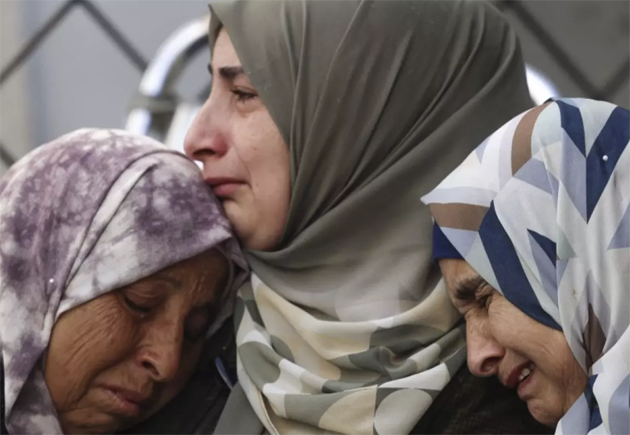
When Israel claimed women were sexually assaulted on a mass scale on October 7, the world exploded. Almost the entirety of Israel’s genocidal war was based on these and other allegations, many unsubstantiated. We all remember the infamous’40 beheaded babies” story, do we not?
This article is not about Israeli allegations per se, neither will it only focus on violations against Palestinian women. This is about a world that is immediately up in arms when one side merely alleges atrocities while it turns a blind eye to actual documented violations against the “other”.
In Gaza, it is painfully clear that we indeed, are ‘the other’. How else can anyone explain the muted cries of women being stripped, raped, starved and murdered practically in real time, on our phone screens, documented in UN reports and described in horrific detail in eyewitness testimonies? There is no other explanation than that Palestinians are what Arundhati Roy calls “Children of a lesser God”. We are the victims of deep-rooted colonialism, one whose geographic demarcations may have vanished but whose insidious, dehumanizing mentality still prevails and manifests in the ugliest of manners.
For nearly six months, Palestinians have endured unspeakable atrocities at the hands of Israel’s occupying army. Today, the Gaza Strip has been reduced to an emaciated shell of what it once was. As Gaza is being systematically decimated and ethnically cleansed, the world, for the most part, looks on. Barring sympathetic supporters and a few well-intended but timid political actors, nothing has been done to stop the carnage. Palestinians once believed there was no way the world would allow Israel to erase Gaza off the map, no way it could see a live-streamed genocide and do nothing. But that is exactly what is happening.
Then, when we thought things could not get any worse, something unfathomable emerged from the deathtrap of Gaza. When this happened, we were certain it would be the turning point in this hellish nightmare. Well-documented reports, corroborated by the UN and eyewitnesses on the ground, told of harrowing stories of sexual assault against Palestinian women in Gaza.
We were paralysed with horror when we heard of women being raped by Israeli soldiers in northern Gaza, assaulted and stripped in front of their families. What’s worse, we all know that in times like these, the undocumented atrocities will far outnumber those documented. Who knows what horrors will unfold once the dust settles in Gaza; no doubt they will be so horrific, our entire nation will be traumatized for years to come.
The real question here is not how Israel’s soldiers perpetrated such gross violations. I think by now we can all agree that this depraved military establishment and its political echelon to boot, has dehumanized and vilified Palestinians so much and for so long, they will justify just about anything. No, the question is more about the moral compass of the rest of the world. While alliances and political interests are always part of the equation, even when the issue pertains to basic human rights, nothing can better explain the blatant hypocrisy, double standards and loss of collective humanity than the deafening silence today.
Our women have not only been killed, starved and displaced, they have been exposed to the very violations that sparked global outrage and a genocidal war against an entire population under occupation, unprecedented in modern history. This is not only unacceptable, it is an indelible stain on humanity. Sexual violence is a crime so heinous it is imperative to condemn and prevent, no matter the perpetrator or the victim. That must always be the baseline in any argument.
Palestinians will never get past this genocide; it is not something you can come back from. However, be assured, this is not only about the Palestinians. The world’s women, the majority of so-called feminists who have remained disgustingly silent, must know this: when you do not stand up for women, all women, no one will stand up for you in your time of need.
A day in the life: a young and single, Palestinian woman
Date posted: April 17, 2013
By Nejwa Ali for MIFTAH

Besan is 23-years old and lives in Beir Nabala, a small village northwest of Jerusalem. A first impression reflects her commitment to Islam, dressed in the traditional hijab (head scarf) and jilbab. Staying true to her faith, every morning she performs ablutions prior to completing the first of her five daily prayers. Afterwards, she insists on drinking a much- needed cup of Nescafe (Palestinian alternative to American coffee) in order to continue with her day, confirming that coffee addictions are universal. Only then, Besan heads to a nearby village where she works full time as a secretary at a local school. In order to maintain good health and physique, she also complements her routine work schedule with trips to the gym. Concurrently, a combination of errands may follow, ultimately with her returning home to eat dinner, complete chores and spend the remaining of the evening with family.
According to traditional Palestinian customs, females are typically expected to be engaged or married when they reach the 18-24 age group (especially, if they have completed their higher education which Besan has) Correspondingly, her eldest sister married at the age of 20 and sequentially her younger sister followed at 18, triggering communal pressure from her parents and village to get married. However, Besan’s dreams and aspirations for the future challenge these expectations in Palestinian society and American misconceptions of Palestinian women. Before “tying the knot”, she’s determined to relocate to the United Arab Emirates and establish herself financially, contesting the Palestinian tradition of the husband’s family role as the primary breadwinner. Besan dreams of independence, financial and social, something which she is determined to achieve. Additionally, she hopes to travel the world with Turkey, Canada and Brazil on her itinerary.
In reality, Besan is practically a mirror image of young people everywhere, including Americans and even Palestinians themselves. They enjoy the company of friends and family; they go to restaurants and coffee shops and in Besan’s case, love to head to the major shopping district near her village, Ramallah’s booming city center.
Nejwa Ali is a Writer for the Media and Information Department at the Palestinian Initiative for the Promotion of Global Dialogue and Democracy (MIFTAH). She can be contacted at mid@miftah.org.
In the wake of human tragedy, human rights are a constant truth
Date posted: April 11, 2013
By Nejwa Ali for MIFTAH
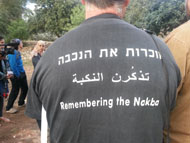
This past Monday, a siren went off, reminding Israelis to observe their traditional moment of silence, honoring victims of the Holocaust. Traffic came to a halt; drivers stepped out of their car and respectfully bowed their heads. Incidentally, Holocaust Remembrance day is internationally recognized on January 27th however, Israelis commemorate the tragedy on April 9, marking the significant Warsaw ghetto uprising, against European Nazis.
The systematic genocide of the Jewish race (among other minorities) within a four and half year period is appalling to say the least. Millions of Jews were relocated to ghettos and then concentration camps, subsequently murdered. Although the Holocaust is an immeasurable tragedy, certain similarities align with Palestinian victims of Israeli occupation. Considering that the majority of Israeli Jews do not travel to the Palestinian territories, they are oblivious to the convoluted Palestinian lifestyle as a direct result of their government. Meanwhile, the rationale behind writing with such a compelling contrast will hit home for Israelis. Most importantly however, it will shed light on the Palestinian cause, absent from Israeli media, forcing responsibility on Israelis to look inward. For this to happen, a mutual understanding is required in order to prevent human right abuses from continuing. Hedy Epstein, a holocaust survivor, turned advocate for Palestine, has coined the phrase, “Never Again (for Jews), Again by Jews.”
Ironically, the following day Palestinian supporters commemorated the massacre of Deir Yassin. Zochrot, an Israeli non-governmental organization aimed at introducing the Palestinian Nakba (catastrophe) to the Israeli-Jewish public, organized a tour of the former village, which has since been renamed Kanfei Nesharim.
Originally, a Palestinian village of an estimated 600 inhabitants, Deir Yassin suffered a violent ambush from Zionist militias on April 9, 1948. Upon their invasion, a warning came over a loud speaker to evacuate immediately. The majority of its residents fled to neighboring villages, fearing for their safety. The families who remained faced brutal attacks, some execution-style murders.
Coincidentally, the Zionist perspective challenges the very existence of Deir Yassin, particularly the massacre. Nevertheless, an official report from the International Committee of the Red Cross (ICRC) refutes any debate. The majority of the dead were Palestinian civilians, (not armed opposition as Zionists claim) and shot at close range; 93 defenseless villagers to be exact. Responsible for accounting the casualties and physical destruction, a member of the ICRC distinctly reported an encounter with a Zionist soldier who bragged about his knife, 60 centimeters long, 10 centimeters wide, double edged, covered in blood. Conversely, Zionist forces carried out massacres and wiped out numerous Palestinian villages over the course of the next decade (Kufr Qassem 1956, Qibya 1953, etc) in order to establish a Jewish state, eerily similar to the Nazi razing of Jewish communities, the majority of whom were transferred to ghettos.
Moreover, the tour comprised of a Deir Yassin native, showing us the house he grew up in, neighboring the primary school he attended. His vivid recollection of Deir Yassin complicates Zionist attempts to erase its historical remains.
Despite varying complexities between the Holocaust and Israel’s occupation of Palestinian territory, several parallels can be drawn from one another, emphasizing a pattern of human rights abuses. For instance, the horrifying conditions of the Jewish ghettos and Palestinian refugee camps or the distinctive identification for Jewish citizens (armbands) contrasting the Palestinian identification cards, (varying colors) both reflect inferiority and limited freedoms.
These historical references highlight the employment of violence and displacement against minorities vulnerable to superpowers. This article aims to commemorate the Jewish and Palestinian suffering. It is not to highlight further divisions but rather so that human rights can one day prevail.
Nejwa Ali is a Writer for the Media and Information Department at the Palestinian Initiative for the Promotion of Global Dialogue and Democracy (MIFTAH). She can be contacted at mid@miftah.org.
CAUGHT IN THE CROSSFIRE
Date posted: April 03, 2013
By Nejwa Ali for MIFTAH
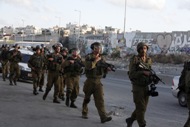
Suddenly, a band of Israeli soldiers marched passed me. A dozen soldiers lined up against the separation wall while another group formed a barrier, blocking the entrance to the checkpoint. Hoping to discourage the presence of worldwide news coverage, soldiers shot several stun grenades directly at reporters. In close proximity, the powerful aftershock completely took over my body. Remaining calm, I asked a soldier whether or not he was aware that they were shooting at journalists. He responded “Don’t worry, those grenades are harmless.” Humanizing being shot at with stun grenades as a normalcy is outrageous; I became fearful that the life threatening weapons were reserved for the Palestinians.
Israel’s heavily armed military presence during a non- violent protest is also an intimidation tactic. Approaching the checkpoint (and soldiers), were dedicated peace protestors armed with banners and Palestinian flags, chanting anti-apartheid slogans. Soldiers immediately shot warning bullets followed with tear gas, eventually dispersing protestors. Subsequently, preventing peaceful demonstrations contradicts Israel’s self described egalitarian status.
Meanwhile, I continued to wait for my ride, only to find out she had to reschedule. Absolutely taken back at the chaotic turn of events, I was ready to call it a day. A journalist warned me to take a seat and let things cool off. Twenty minutes passed, and soldiers were still firmly aiming at the protestors. Accordingly, I asked a soldier if they were done shooting so I could head back to Ramallah, and his response was, “You’re free to leave but I can’t promise that I won’t shoot.”
Israel’s complete disregard for life, affirms their oppressive regime against the Palestinian people. Their excessive use of force against a nonviolent population draws parallel to behaviors of previous oppressive regimes such as apartheid South Africa. Moreover, their attempt to influence Palestinians to succumb to Israel’s tyrannical rule needs immediate intervention by the international community.
The aforementioned Israeli practices in the occupied Palestinian territories exemplify the definition of apartheid. In exchange for sympathy, I challenge my audience to vocalize support for the Palestinian right to exist. Frankly, Palestinians were nonviolently protesting on Palestinian territory. Israeli soldiers invade Palestinian territory and utilize force to crush an otherwise innocuous protest, sometimes resulting in deadly outcomes. No surprise since Israel is one of the most technologically advanced militaries in the world. Still, Palestinian continue to protest courageously, despite facing imminent threat, refusing to give up their fight for freedom and peace.
Nejwa Ali is a Writer for the Media and Information Department at the Palestinian Initiative for the Promotion of Global Dialogue and Democracy (MIFTAH). She can be contacted at mid@miftah.org.
Breaking the Cycle
Date posted: March 28, 2013
By Nejwa Ali for MIFTAH
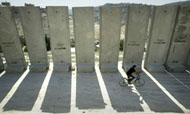
Last week, US President Barack Obama paid tribute to lifelong ally Israel, his first visit to the region as President, symbolizing his unwavering stance on the Palestinian-Israeli impasse.
In front of American media, Obama has been consistent, viewing Israeli settlement expansion as detrimental to any legitimate peace process, straining relations with Israel’s Prime Minister, Benjamin Netanyahu. However, Mr. Obama admitted that he had no plan to for push peace talks, stating that Israel was not interested, dismissing any effort to do so as a waste of time.
However, a completely different tone was taken on this past week. Obama pledged his allegiance to Israel, solidifying his unconditional support and Israel’s right to defend against any threat to their nation’s security, completely ignoring the continuous situation of Israeli colonization of Palestinian territory. Accordingly, his criticism falls short of any concrete progression towards peace. Instead of bolstering this kind of behavior without consequence, Obama needs to take an aggressive approach forcing Israel towards a peace deal. Perhaps slashing U.S. financial support, conversely what they did to the Palestinian Authority when they submitted their application to the United Nations for statehood (completely undermining the U.S. position of supposedly supporting an independent Palestine state), would prove effective?
Sidelining the Palestinian cause, Obama invested his time and energy into securing an Israeli apology to Turkey and restoring diplomatic ties between nations. Adding insult to injury for the Palestinians, it turns out Obama scored an accomplishment after all. Unfortunately, Obama’s near silence regarding the Palestinian people’s national rights reflected his poor leadership in this regard and lack of commitment towards resolving this conflict. Hence, he negated himself as an influential peace leader in the eyes of the Palestinians, who saw him more of the stereotypical political pawn.
Coincidentally, during the same week of Obama’s trip to Israel, I visited east Jerusalem. As an American citizen, I am privileged with complete access to Jerusalem, even though some of my family, born and raised in Palestine, are excluded from visiting the city. According to Israeli law, any person with Palestinian identification, residing within the West Bank and Gaza Strip are prohibited from entering Jerusalem. Ultimately, depriving Palestinians (Muslims and Christians) the freedom to worship and restrict their ability to travel freely, defines a situation tantamount to apartheid.
On my trip to Jerusalem I admired religious sites and walked around neighborhoods, marveling at the breathtaking views. Still, an eerie calm lingered. A paradox began to unravel. Israelis go about their day nonchalantly, with the daily Palestinian theme of “the occupation” taboo from their discussions. A snapshot of the New York City lifestyle, Israelis live comfortably with plentiful resources at their disposable. In comparison, Palestinians are forced to do with the insufficient resources at their disposal. If I were a typical tourist, for the first time in the region, I would be oblivious to the humanitarian crisis Israel imposes on the Palestinians. However, Obama is not a tourist. He is fully aware of the humanitarian abuses and Israel’s oppressive occupation and continues to fund it with American tax dollars. This kind of support needs to come to a halt.
As Israel’s occupation of Palestine approaches its seventh decade, I would like to remind President Barak Obama to be a man of his word and follow his own campaign slogan of moving forward towards change. Stand firmly against Israel’s occupation and prevent another generation of Palestinian youth from being born and raised under it.
Nejwa Ali is a Writer for the Media and Information Department at the Palestinian Initiative for the Promotion of Global Dialogue and Democracy (MIFTAH). She can be contacted at mid@miftah.org.
14 Emil Touma Street,
Al Massayef, Ramallah
Postalcode P6058131
P.O.Box 69647
Jerusalem
972-2-298 9490/1
972-2-298 9492
info@miftah.org




